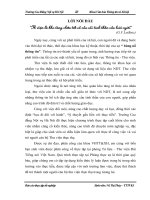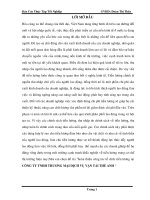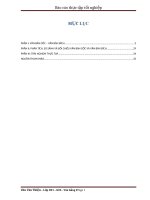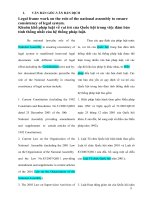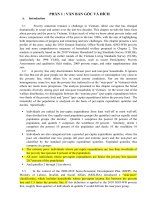Báo cáo thực tập tốt nghiệp tiếng anh (60)
Bạn đang xem bản rút gọn của tài liệu. Xem và tải ngay bản đầy đủ của tài liệu tại đây (76.25 KB, 13 trang )
VINH UNIVERSITY
FOREIGN LANGUAGE DEPARTMENT
***********
AN INVESTIGATION INTO THE USE OF GROUP
ORAL PRESENTATION TO DEVELOP
SPEAKING SKILL OF THIRD-YEARS ENGLISH
MAJOR STUDENTS AT VINH UNIVERSITY
( MỘT SỰ ĐIỀU TRA VỀ VIỆC SỬ DỤNG THUYẾT TRÌNH NHĨM
ĐỂ NÂNG CAO KỸ NĂNG NĨI CHO SINH VIÊN NĂM THỨ BA
CHUYÊN NGÀNH TIẾNG ANH TẠI TRƯỜNG ĐẠI HỌC VINH )
STUDENT: HỒNG THỊ THÙY VUI
LECTURER: NGUYỄN THỊ BÍCH HIỀN
VINH 2014
1
PART I : INTRODUCTION
1.
2.
Reasons for choosing the topic
Nowadays, English has become an international language, it
has become a vital part of international society, culture and
economy. More than half of million people speak English and
many countries use it as the official or second language. Whether
we are aiming to be a professor, a reporter, a doctor, or a teacher,
etc……….Knowing English can give us what it takes to
succeed. There are four main English skills: reading, speaking,
listening, and writing. However, speaking is regarded as the
most challenging skill. Many people get trouble with speaking
skill, they are not confident to speak in public as with other
people by English.
When studying at foreign language department of Vinh
university, the author found out that many students get some
problems in speaking skill, some teachers of this department
have used group oral presentation for their students to develop
speaking skill. The author realized that this is an effective
method and decided to carry out the action research to indicate
some benefits by using group oral presentation in speaking skill.
Based on the results of this research, the author hope that
students not only improve but also develop their speaking skill
naturally and the author also hope this study may make a
contribution to the quality of teaching ang learning of speaking
skill at Vinh university.
Aims of the study.
The study is done with the following purpose:
- Investigate the real situation of using group oral presentation
in speaking skill at foreign language department, Vinh
university.
- Investigate the effectiveness of using group oral presentation
in speaking skill.
2
Provide some suggestions for third-years students at Vinh
university using group oral presentation in most effective way
to develop speaking skill.
Research question.
- To fully achieve the aim, the study should answer the
following research questions:
• What are the attitudes of students and teachers towards the
group oral presentation?
• What obstackes do the teachers and students cope with
using group oral presentation in speaking skill?
• What
suggested techniques of using group oral
presentation can be applied for effective speaking skill?
Scope of the study.
Within the limitation of the study, the author would like to
focus on investigation of using group oral presentation in
speaking skill at foreign language department, Vinh university.
In this research, the author intends to make a brief view of the
current situation of teaching and learning English speaking at
Vinh university, identify the importance of using group oral
presentation into speaking skill. There fore, giving some
suggestion to help students improve speaking skill. The research
is carried out at Vinh university.
Methods of the study.
Due to the aims and scope of the study, the combination of
quantitative and qualitative methods is intended for the study:
• The quantitative method has been obtained by survey
questionnaires that were given to students at Vinh
university mentioned in the study, those questionnaire
are designed with variety of response options and thus
are easy to answer.
•
In order to gain the most successful result, data
collected through questionnaire. Collested data will be
processed and analyzed.
• The study employed qualitative approach, data were
collected via interview.
-
3.
4.
5.
3
6.
Format of the study.
The study consists of three parts:
- Part I: “ Introduction” presents the justification of the study,
the aims, the research questions, the methods, the scope and
the format of the study.
- Part II: “ Development ” has three chapters:
Chapter 1: literature review presents the concepts
relevant to the research topic such as: Definition of
speaking skill, group oral presentation, the importance
of speaking skill, the classification of speaking skill.
Chapter 2: The survey deals with the attitudes of the
teachers and students at foreign language department,
Vinh university towards using group oral presentation,
the present situation, the effectiveness of using group
oral presentaion into speaking skill at Vinh university.
Chapter 3: Recommendations and suggestions for using
group oral presentation in speaking skill, discuss some
recommendations and suggested to use group oral
presentation in most effective way.
- Part III: “ Conclusion ” summarized the study and provides
some suggestions for the further study.
PART II: DEVELOPMENT
CHAPTER 1: LITERATURE REVIEW
4
1.1. Speaking skill.
1.1.1. Definitions of speaking skill.
There have been numerous definitions of speaking skill.
Tarigan (1990:3-4) defines that speaking is a language skill that is
developed in child life, which is produced by listening skill, and at
that period speaking skill is learned.
Based on Competence Based Curriculum speaking is one of the four
basic competences that the students should gain well. It has an
important role in communication. Speaking can find in spoken cycle
especially in Joint Construction of Text stage (Departmen Pendidikan
Nasional, 2004). In carrying out speaking, students face some
difficulties one of them is about language its self. In fact, most of
students get difficulties to speak even though they have a lot of
vocabularies and have written them well. The problems are afraid for
students to make mistakes.
According to Ladouse (in Nunan, 1991: 23) speaking is described as
the activity as the ability to express oneself in the situation, or the
activity to report acts, or situation in precise words or the ability to
converse or to express a sequence of ideas fluently. Furthermore,
Tarigan (1990: 8) said that “Berbicara adalah cara untuk
berkomunikasi yang berpengaruh hidup kita sehari-hari”. It means
that speaking as the way of communication influences our individual
life strongly.
From the explanation above, the researcher concludes that speaking is
what we say to what we see, feel and think. When we feel something,
we want someone can hear us. So, in this process we can call it is an
interaction between two sides.
1.1.3. Classification of speaking skill.
5
Brown (2003:141) states as with all effective tests, designing
appropriate assessment tasks in speaking begins with the specification
of objective or criteria. Those objectives may be classified in term of
several types of speaking performance:
1.
Imitative
At one end of a continuum of types of speaking performance is the
ability to simply parrot back (imitate) a word or phrase or possibly a
sentence. While this is purely phonetic level of oral production, a
number of prosodic, lexical and grammatical properties of language
may be conclude in the criterion performance.
2.
Intensive
A second type of speaking frequently employed in assessment
contexts is the production of short stretches of oral language designed
to demonstrate competence in a narrow band of grammatical, phrasal,
lexical of phonological relationship (such as prosodic elementintonation, stress, rhythm, juncture). Examples of extensive
assessment tasks include directed response tasks, reading aloud,
sentence and dialogue completion limited picture-cued task including
simple sequences and relationship up to the simple sentence level.
3.
Responsive
Responsive assessment tasks included interaction and test
comprehension but at the somewhat limited level of very short
conversations, standard greetings and a small talk, simple request and
comments and the like.
1.1.3. The importance of speaking skill.
Speaking skills are important for career success, but certainly not
limited to one’s professional aspirations. Speaking skills can enhance
6
one’s personal life, thereby bringing about the well-rounded growth
we should all seek.
1.2. Teaching English speaking communicatively
1.2.1. Communicative language teaching.
Communicative language teaching (CLT), or the communicative
approach, is an approach to language teaching that empasizes
interaction as both the means and the ultimate goal of study.
Communicative language teaching rose to prominence in the 1970s
and early 1980s as a result of many disparate developments in both
Europe and the United States. First, there was an increased demand
for language learning, particularly in Europe. The advent of
the European Common Market led to widespread European migration,
and consequently there was a large population of people who needed
to learn a foreign language for work or for personal reasons. At the
same time, children were increasingly able to learn foreign languages
in school. The number of secondary schools offering languages rose
worldwide in the 1960s and 1970s as part of a general trend of
curriculum-broadening and modernization, and foreign-language
study ceased to be confined to the elite academies. In Britain, the
introduction of comprehensive schools meant that almost all children
had the opportunity to study foreign languages.
1.3. Group oral preaentation in speaking.
1.3.1. Definition of group oral presentation.
An oral presentation involves explaining something to an audience,
usually in a classroom, but sometimes in a work setting. Teachers
grade oral presentations based on the quality of the information
presented as well as the method of presenting it.
1.3.2. Benefits of using group oral presentation.
1.3.3. Types of group oral presentation.
7
1.3.4. The role of the teacher using group oral presentation.
CHAPTER 2: THE SURVEY
2.1. An overview of the survey.
2.1.1. Aims of the survey.
2.1.2. Informants and setting.
2.2. Descriptions of the survey questionnaires.
2.2.1. The survey questionnaire for the students.
2.2.2. The interview questions for the teachers.
2.3. Survey results and data analysis.
CHAPTER 3: Some recommendations and suggestions for
using group oral presentation in speaking skill.
3.1. Some recommendations for using group oral presentation in
seaking skill.
3.2. some suggested into the use of group oral presentation in most
effective way to develop speaking skill.
PART III: CONCLUSION
1. Recapitulation
2. Suggestion for futher study.
SURVEY QUESTIONNAIRE
( For students )
8
This survey questionnaire is conducted to serve my study on “ AN
INVESTIGATION INTO THE USE OF GROUP ORAL PRESENTATION
TO DEVELOP SPEAKING SKILL OF THIRD-YEARS ENGLISH
MAJOR STUDENTS AT VINH UNIVERSITY ” I would be grateful if
you could provide accurate and frank answers, which will contribute
much to the success of my research. You can be sure that your name
will not be identified in any data analysis. Thank you in advance for
your time and cooperation !
Please answer the question or circle your choice.
1. How long have you been learning English?
..............................................................................................................
..............................................................................................................
2. How important is group oral presentation in speaking classes?
a. Very important
c. Neutral
b. Important
d. Not important
3. How often your teacher use group oral presentation in speaking
classes?
a. Always
c. Sometimes
b. often
d. Rarely
e. Never
4. What do you think of group oral presentation?
a. I don’t like this activities.
b. Students have more chances to speak English.
c. It’s bad for students
d. I have no ideas.
5. Which factors prevent your speaking skill in group oral
presentation?
a. Large group
c. Lack of background
9
b. Lack of vocabulary
d. Shyness
6. What difficulties hace you faced in group oral presebtation?
a. Participant’s mixed level
tongue
c. Partner’s use of mother
b. Lack of teacher’s instructions
d. Limited time
7. What are your oppinions on the benefits of using group oral
presentation in speaking skill?
…………………………………………………………………………
…………………………………………………………………………
…………………………………………………………………………
…………………………………………………………………………
…………………………………………………………………………
…………………………………………………………………………
…………………………………………………………………………
…………………………………………………………………………
…………………………………………………………………………
……………………………………………….
Thank for your cooperation !
INTERVIEW QUESTIONS FOR TEACHERS
Please answer my question. Thank for your cooperation !
10
1. In you oppinion, are group oral presentation necessary and important in
speaking skill? Why?
……………………………………………………………………………………
……………………………………………………………………………………
……………………………………………………………………………………
……………………………………………………………………………………
……………………………………………………………………………………
……………………………………………………………………………………
………
2. What do you have any difficulties in using group oral presentation for your
students ?
……………………………………………………………………………………
……………………………………………………………………………………
……………………………………………………………………………………
……………………………………………………………………………………
…………………………………………………..
3. From your own experience, could you please suggest some solution to make
English speaking more effective when using group oral presentation?
……………………………………………………………………………………
……………………………………………………………………………………
……………………………………………………………………………………
……………………………………………………………………………………
……………………………………………………………………………………
……………………………………………………………………………………
……………………………………………………………………………………
………………………………………
11
VINH UNIVERSITY
FOREIGN LANGUAGE DEPARTMENT
***********
AN INVESTIGATION INTO THE USE OF GROUP
ORAL PRESENTATION TO DEVELOP
SPEAKING SKILL OF THIRD-YEARS ENGLISH
MAJOR STUDENTS AT VINH UNIVERSITY
VINH 2014
12
13



